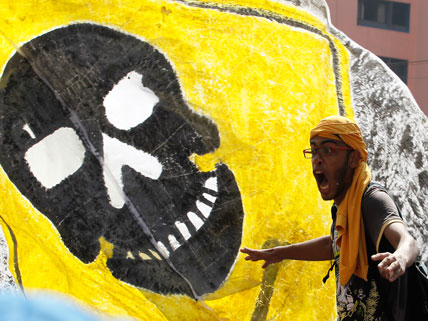A supporter of deposed Egyptian president Mohammed Morsi protesting in Cairo, August 2013
For the last two and a half years, turmoil has been a way of life for Egyptians, but recent weeks have been the most violent and deadly in the Arab republic’s history. In June antigovernment protests brought millions of Egyptians into the streets, to express opposition to the country’s democratically elected president, Mohammed Morsi. On July 3 the Egyptian army stepped in and removed President Morsi from office, in what some have called a military coup d’état. Over the weeks that followed, Morsi’s supporters, most of whom are members of the Muslim Brotherhood, waged huge protests and confronted security forces. On August 14, brutal clashes resulted in the deaths of hundreds of Egyptians, mostly Morsi supporters. At least one hundred security forces also were killed.
In its crackdown, the army, led by General Abdel Fattah al-Sisi, declared a state of emergency, including a nightly curfew. In the midst of this conflict, attacks on Egyptian Christians and churches across the country also increased. As security forces imprisoned many of the leaders and supporters of the Muslim Brotherhood, a tense stability has been restored to the country.
In early 2011 a revolution had toppled Egypt’s longtime dictator Hosni Mubarak. Although the Egyptian army had a hand in ruling the country until elections were held, it was more or less sidelined. Democratic institutions were established, and in what were hailed as Egypt’s first-ever free and fair elections, the Muslim Brotherhood’s candidate, Morsi, was elected. The Brotherhood won the most seats in parliament as well, and they shaped the drafting of a new Islamist constitution.
However, a close analysis of ballot results and voter turnout reveals that the extent of the Brotherhood’s popularity was significantly less than it appeared. Thus, when the Morsi administration’s heavy-handed rule pushed the country aggressively in an Islamist direction, protests erupted again, not unlike the protests against Mubarak in 2011. Egypt’s future as a democracy is seriously in question, but a civil war has been averted.
Image Credit: © MUHAMMAD HAMED/Reuters/Corbis
Related Links
- Q&A: Egypt in Turmoil
This article provides perspective on the turmoil in Egypt that began over the summer.
(Source: BBC News, August 21, 2013) - With Brotherhood Out, Old Order Shapes Egypt’s Future
This article analyzes the future of Egypt in the wake of the military ouster of the democratically elected President Mohammed Morsi and the protests that followed.
(Source: VOA News, August 29, 2013) - Egypt
This web page is a “clearinghouse” for all current and recent stories by the international news organization Reuters on the ongoing crisis in Egypt.
(Source: Reuters; accessed August 31, 2013) - Egypt: What Poll Results Reveal about Brotherhood’s Popularity
Recent polling data help explain both the rise and political effectiveness of the Muslim Brotherhood prior to the ouster of President Morsi and their rapid loss of apparent popular support.
(Source: BBC News, August 29, 2013) - Did Morsi Ouster Save or Destroy Egypt’s Democracy?
This article presents opposing viewpoints about the state and future of Egyptian democracy in the wake of the army takeover.
(Source: VOA News, August 29, 2013)





Ummm.. Wat date was this in
it’s quite nice to read all about the upheavel egypt….and it’s also gives me great thought to build up my own summary for these thing.
i know that,but you know that i hate reading….i wish i will be just like you….
when was this
can some one put this in summary
i will
wow i can’t believe this is happening in egypt i wonder when al this war and fighting will end i egypt……..
this is good for me to read if you like reading say wat
I KNOW RRRRRRRRRRRRRRRIGHT
do you guys know who the author is or is there not an author